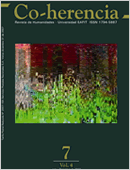Los textos como acciones del lenguaje.
##plugins.themes.bootstrap3.article.main##
Keywords
Resumo
Las dificultades en la enseñanza de la lengua constituyen una problemática actual, que no puede abordarse sin un estudio epistemológico desde el que se fundamenten las opciones frente al objeto de enseñanza. El marco del interaccionismo sociodiscursivo se presenta como perspectiva teórica que articula enfoques filosóficos, lingüísticos y psicológicos del lenguaje como actividad colectiva que nos determina socialmente. Los textos y discursos en tanto productos del lenguaje son los objetos y formatos que, respectivamente, permiten desarrollar a los humanos en la formación escolarizada. Asimismo, la didáctica de las lenguas como campo de investigación de las interacciones formativas se articula en esta perspectiva de estudio del desarrollo humano.
Downloads
Referências
Bajtín, M. (1992) Estética de la creación verbal. México, Siglo XXI.
Bajtin, M.; Voloshinov, V. (1998) ¿Qué es el lenguaje? Buenos Aires, Almagesto.
Bronckart, J.P. (1985) Las ciencias del lenguaje: ¿un desafío para la enseñanza? Paris, Unesco.
Bronckart, J.P. (1997) Activité langagière, textes et discours.Pour un interactionismesocio-discursif. Paris, Delachaux et Niestlé.
Bronckart, J.P. (1998) “Psychologie et Problématiques Éducatives“. En: Anuariode Psicología 29, Nº 2.
Bronckart, J.P. (2000) “La psychologie ne peut être que sociale et la didactiqueest l’une de ses disciplines majeures“. En : Sciences de la culture. Approchessémiotiques. Paris, La Découverte.
Bronckart, J.P. (2001)“S’entendre pour agir et agir pour s’entendre“. En: RaisonsEducatives 4. Théories de l’action et interventions formatives. Genève.
Bronckart, J.P. (2002) “La explicación en Psicología ante el desafío del significado”.En: Estudios de Psicología 23, Nº 3.
Bronckart, J.P. (2002a) “Entrevista a D. Riestra”. En: Propuestas 7, Cela,Universidad Nacional de Rosario.
Bronckart, J.P. (2003) “L’analyse du signe et la genèse de la pensée consciente“.En: Cahiers de l’Herne 76.
Bronckart, J.P. y Schneuwly, B. (1991-1996) “La didáctica de la lengua materna,el nacimiento de una utopía indispensable”. En: Textos 9.
Coseriu, E. (1987) Gramática, semántica, universales. Estudios de lingüística funcional. Madrid, Gredos.
Del Río, P. y Álvarez, A. (2002a) “From activity to directivity. The question ofinvolvement in education“. En: G. Wells y G. Claxton (Eds.) Learning for life inthe 21st Century: Sociocultural perspectives on the future of education. Oxford,Blackwell.
Del Río, P. y Álvarez, A. (2002b) Desarrollo, cultura y educación. La aproximaciónal diseño cultural (texto inédito del curso de postgrado Desarrollo, cultura y educación.La aproximación al diseño cultural, CRUB, Universidad Nacional del Comahue).
Leontiev, A. (1983) El desarrollo del psiquismo. Buenos Aires, Akal.
Luria, A. (1995) Conciencia y lenguaje. Madrid, Visor.
Maturana, H. (1993) Desde la Biología a la Psicología. Santiago, Synthesis.
Maturana, H. (1995) La realidad: ¿objetiva o construida? Barcelona, Anthropos.
Riestra, D. (2004, Thèse de Doctorat –FPSE 328) Las consignas de trabajo en el espacio socio-discursivo de la enseñanza de la lengua. Université de Genève.
Saussure, F. (1915-1961) Curso de Lingüística General. Buenos Aires, Losada.
Saussure, F. (2004) Escritos sobre lingüística general. Barcelona, Gedisa.
Schneuwly, B. (1994) “Genres et types de discours: considérations psychologiqueset ontogénétiques“. En: Les interactions lecture-écriture. Actes du Colloque Théodile-Crel, Bern, Peter Lang
Vygotski, L. (1934-1995) Pensamiento y lenguaje. Barcelona, Paidós.
Vygotski, L. (1934-1973) Pensamiento y lenguaje. Buenos Aires, La pléyade
